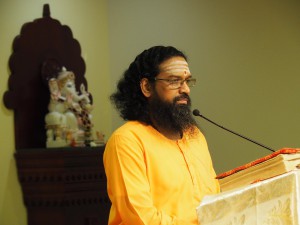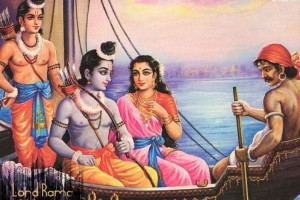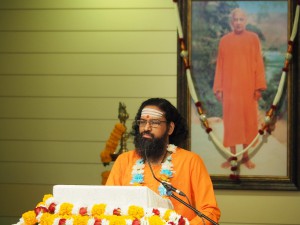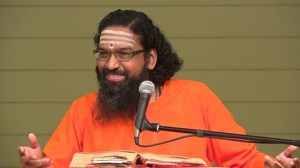Yagna on ‘Ayodhya Kand’ – Part 2 March 2017
Talks on “Ayodhya Kand” – Part 2 – by Swami Abhedananda
(Gyan Yagna conducted from 1st March till 6th March, 2017)
Key Points from the Discourses
Day 1
Ramayan is a scripture full of characters who have lived the quintessential qualities among humans. Most exemplary of all characters being that of Lord Rama. The first day of this month’s yagna on ‘Ayodhya Kand’ saw Swami Abhedananda beautifully describing the various aspects of Bhagwan Ram’s glorious character, inspiring one and all in the audience to imbibe His qualities in our own humble capacity. Below are a few gems from the day’s discourse:
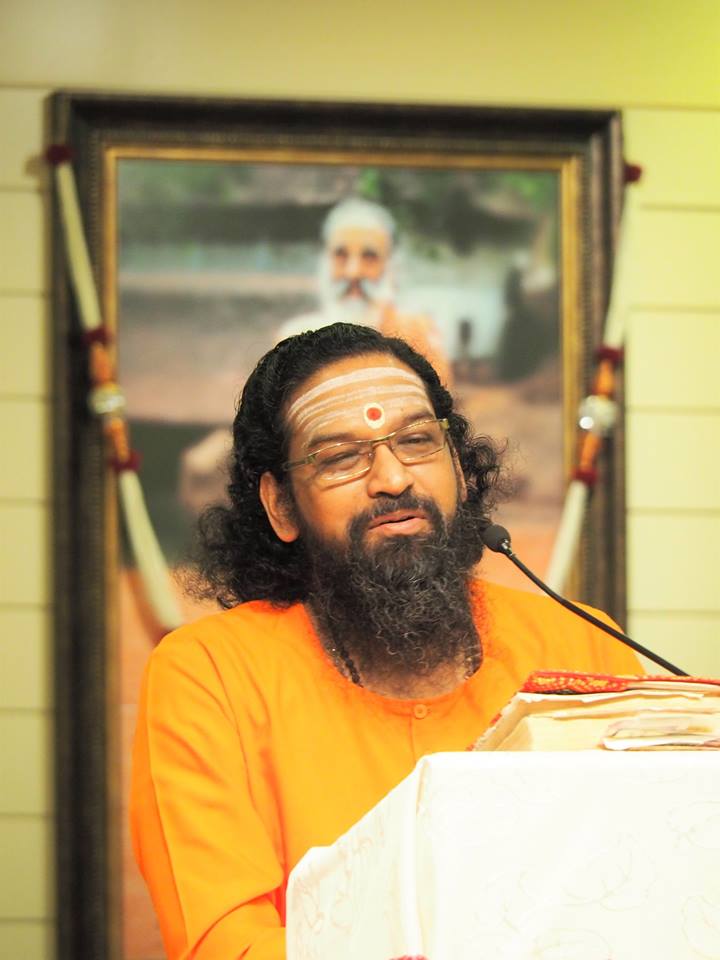 Bhagwan Ram’s Perfect Responses:
Bhagwan Ram’s Perfect Responses:
- This world constantly demands response from us. When an outer situation comes, there is a corresponding inner thought with that situation. That inner thought decides whether a person is weak or strong. The ultimate result of that inner thought is that either you are happy, or sad, or angry, or depressed. The beauty of Bhagwan Ram’s character is that His responses were always perfect. In Bhagwan Ram’s responses we see that His emotions are highly exalted, His attitude is extremely chaste, and His equipoise is totally unchallenged.
- A person is known by which thought he brings out at what time. Even when the worst thought could have come out, still if one manages to bring out very good thoughts, then that is the beauty of his character. When the thought of anger should have come after hearing Kaikayi’s demands, Bhagwan Ram had no trace of anger at all.
Greatness of Mother Sumitra:
It is said that when Lakshmanji went to Mother Sumitra to take permission to go to the forest with Bhagwan Ram, Sumitraji said, “Lakshman! The fruit of all actions is to have love at the feet of Bhagwan Ram and Sita. It is because of you alone that they are going to the forest. Go with them and see that you are able to give them joy.”
Everything that we get in life is not to enjoy, but to offer to someone higher. It is very easy to use someone for yourself, but very difficult to offer him/her to the Lord. Sumitraji offered both her sons – Lakshmanji in the service of Ramji and Shatrughnaji in the service of Bharatji. Such was her renunciation!
Establishing the Importance of Dharma:
- When Ramji went to seek permission of Dashrathji to leave for the exile, Ramji said, ‘Oh father! Please give me your permission and blessings. It is the time of rejoicing, you should not be so sad.’ Those who are saints, for them, leaving is a play, they can leave everything. And those who are samsari, they can’t leave anything. For them, even if one small thing is taken away, they go into deep depression and sadness.
- Ramji said to Dashrathji, “We should not be inadvertent while loving because love doesn’t mean that we should not respect our dharma. Dharma is the supreme-most. One should follow his dharma even if there is pain involved. If you don’t allow me to go then people will say that Dashrathji minced his words and he didn’t follow his words because of his love.” There is no dharma which doesn’t involve pain. While following dharma, when one bears the pain, then he becomes stronger.
- To follow dharma, one has to be very firm. Most of us are stubborn but not firm. To be firm for our egoistic satisfaction is to be stubborn. But to be firm for following the path of righteousness is called as being determined. If you are not firm, you can’t even wake-up on time every morning, you can’t do your daily japa and sadhana, you can’t please anyone. No big work can be done unless the person is determined.
Glory of Dispassion:
- When Kaikayi called Bhagwan Ram and told Him that He had to go to the forest for 14 years, He smiled. He had such a sacrificial heart to give-up anything. We often get sad because the situation is demanding us to give-up something, be it certain ideas or emotions, or vasanas, or insistence, and we are unable to give it up. More is one’s capacity to leave, more he will be quiet!
- Faster you can leave anything, more is the dispassion. Bhagwan Ram immediately put the attire of the sage and the bark of the tree. He was equally comfortable in the bark as He was in His royal attire. Such egoless and selfless personality He had! Bhagwan Ram was so joyous all the time that it was very easy for Him to leave His big palace, and all His comforts and luxuries. Dispassion means that one doesn’t have the sense of joy anywhere outside.
- More you are evolved, more will be your qualification to leave something faster. Anybody is sad because something has left him, and he is not able to leave that thing. World is such that, even if you don’t leave, things will leave you, people will leave you.
Joy-giving nature of Bhagwan Ram:
As Bhagwan Ram prepared to leave Ayodhya, there are three important things to note about Bhagwan’s conduct – He offered aadar (respect) to Brahmins and elders, gave daan to poor (donation) and also had vinay (politeness).
We must respect our elders. Respecting means that ‘I accept that you are bigger than me and in front of you I will always know less.’ Respecting means that ‘whenever we will clash, I will allow you to win and I will lose.’ Daan (donation) implies that ‘what is mine, belongs to you as well’ and Vinay means ‘I am very soft for you.’
Righteousness of Bhagwan Ram:
To follow Dharma is very difficult. If Bhagwan Ram had attachment, He wouldn’t have followed dharma; if He had anger against Kaikeyi, He wouldn’t have followed dharma or if He would have had infatuation for palace and luxury, He wouldn’t have followed dharma. Nobody’s life is easy, but when we follow Dharma, life becomes easier . Not following Dharma gives some temporary joy, but later it gives more sorrow than the sweet pain we would have experienced while following dharma.
Renunciation:
- To live with God and saints, and to match their renunciation is very difficult as their standards are very high. Anybody who lived with Bhagwan Krishna or Bhagwan Ram, had to renounce a lot. Yashodaji lived with Bhagwan for 11 years and then she did not see Him at all. Devakiji was with the Lord for a few moments and then saw Him only after 11 years. Pandavas had to go from forest to forest. Bharatji kept waiting for Bhagwan for 14 years. Lakshmanji had to conquer his hunger, thirst and sleep to serve the Lord constantly during His exile. Sitaji was separated from Bhagwan Ram for 10 months when she was abducted by Ravan and then later when they returned to Ayodhya, she had to go back to the forest because of the words of a washer-man. All of them were monuments of renunciation!
- Any role, if one has to play well, a lot of sacrifice is required. To live and learn from any higher person, we have to leave our ego, desires, anger, laziness etc. Otherwise we will miss to come-up to the standards of the higher person and will not be able to please Him. We can please someone only when He sees that we have given up for Him.
Day 2
On the second day of the monthly yagna, Swami Abhedananda described further the beautiful character of Lord Ram. He also explained in detail about the law of Karma and how having the right knowledge is the only way of developing the right convictions translating to the right actions that will bear good fruits in the form of a conducive fate. Below are a few golden nuggets from the day’s discourse:
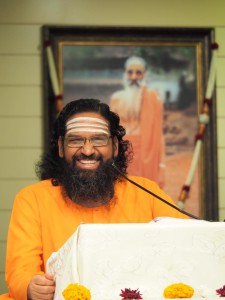 The beautiful character of Bhagwan Ram:
The beautiful character of Bhagwan Ram:
- Bhagwan Ram is manifestation of Dharma. Dharma is that which gives us the capacity to be firm and determined. Bigger is the dharma of a person, more firm he has to be. Bhagwan Ram was very polite, humble, pleasant, charming, beautiful, and attractive; but at the same time He was very firm. That means He followed His dharma.
- Bhagwan Ram went to the forest from an extremely sad environment, but even then He was happy to see the Ganges. When a person has less ego, he is happy to drop a thought faster. Our minds should be fresh. Freshness of the mind is there when we don’t hold onto something small. The beauty of life is finding out the cause of happiness in the most disturbing situation too.
- One should have a lot of emotions, but emotions should not erode our capacity to do right. Bhagwan Ram had a lot of emotions, but He never did anything wrong. His emotional personality was very developed. He cried terribly for the vulture Jatayu who tried to save Mother Sita. He embraced and loved Bharatji a lot after returning to Ayodhya, such were His emotions!
Uncertain situations:
We don’t know what all situations will meet us in life. One day Lord Ram was sleeping comfortably on kingly bed and the other day he slept on the floor. However, He lied down with the same joy as if He was lying down on the palatial bed. Life is full of pairs of opposites. Bhagwan Ram’s joy doesn’t go anywhere, wherever He is, His personality is such that He is full of joy and glee all the time.
Lakshman Gita:
Nishadraj saw that Bhagwan Ram and Sitaji were using their hands as a pillow. Nishadraj got very sad, he started crying and said, who has such a palace, whose father’s throne is shared by Indra, fie upon Kaikeyi! Then Lakshmanji explains to Nishadraj in words full of knowledge, dispassion and devotion which is called ‘Lakshman Gita’.
- Play of Karma:
- Lakshmanji said that there is no one who gives joy and sorrow to anyone. Your own actions come as sukh (joy) and dukh (sorrow). Whatever actions we have done, they come to us at their own respective time. Nobody can give you what is not in your fate and nobody can take away what is in your fate.
- It is not the people who come in our life, but it is the containers of joy and sorrow that come through them. A person can be a big source of joy for someone, and the same person can be a big source of sorrow for someone else. Bhagwan uses everybody to give various kinds of fruits of actions to us.
- The belief in the ‘karma-phal’ (fruits-of-action) makes you free from thoughts of the future and makes you happy. If somebody is giving you trouble, then you think that he is not responsible, you would have anyways got the trouble from somewhere else. And therefore you won’t hate anybody. And if somebody is very good to you, then you will not have attachment because you will think that if he was not there someone else would have done good to you.
- The play of Karma is such that you just don’t know what fruit will come at what time. Sometimes it so happens that the person who was the source of your sorrow becomes the source of your joy, and the person who was the source of your joy becomes the source of your sorrow; one who was your critic starts praising you, and one who was praising becomes your critic.
- Ignorance veils Reality:
- Who truly is ours in this world? This body, the relations, mother, father, husband, children, wife, property, house, wealth etc, all are a mere dream. There is no reality here. As in the dream, a beggar becomes a king and a king becomes a beggar, but there is no gain or less when the dream is broken, similarly in this world there is no reality. Therefore Lakshmanji says to Nishadraj – ‘Don’t get angry on Kaikayi etc. It is nobody’s fault. Everybody is deluded.’ Every experience is like a dream because it won’t be there in future.
- Living in the light of Knowledge:
- Lakshmanji says that a Yogi is the one who is awake in the night of delusion because he has dispassion from everything, and he has no attachment to anyone.
- We should live in the proper light of knowledge. More is the light in our life, lesser will be the sorrow. When a person lives in his own enlightened world, then he will never be unhappy since he has no desire for anything. He has no attachments. He sees everything as a dream. More a person has sorrows, it shows the lack of dispassion in his life.
- When one is attached to Bhagwan’s feet, then his delusion and ignorance goes away and he is enlightened. For an enlightened person, only God is the source of sorrow or joy in his life.
- A saint’s dream is to just revel in Lord’s katha and leelas. He does not have any desire to go anywhere or meet anyone. He prays to God to give him His love and His memories. Such a person has dispassion, and his love is for God alone!
Day 3
Today we bring to you some highlights of the third day of the monthly gyan yagna, where the devotees were treated with yet another spiritual delight by Swami Abhedananda. In his enlightening satsang, Swamiji said:
Goswami Tulsidasji says that when Sumantji pleaded in front of Bhagwan Ram to come back to Ayodhya, Ramji said to him, “It is the dharma of a son to protect the words of the father. I will lose my fame if I don’t follow my dharma, and losing the fame is worse than dying.”
- Dharma is the training of mind through which we do what we should do even if it is painful and we stop ourselves from doing what we like to do but is not good.
- Dharma is the one which holds a person’s confidence and gives him credibility. Dharma is the one through which you have a self faith that you won’t do wrong.
- Dharma is the one through which you are firm in your vows. You know that you won’t be having a lose end in your life. You can say with confidence, ‘I am certain that today I won’t be angry, I won’t be passionate, I won’t lose my temper, and I won’t lose my emotions.’
- The happiness in life depends on how much certainty you have about your mental poise that you won’t lose you balance under any situation.
- When you are sure that you will do the right thing only and you are not afraid of doing the right thing – that constitutes the essence of dharma.
Why is the path of dharma difficult?
- Following dharma is not always pleasant; it sometimes causes mental and emotional pain. But it is better to go through the pain for a few hours or days, rather than going through the pain your own life.
- The ability to stop your mind, the ability to curb your emotions at your will, the ability to sublimate your wrong thoughts through your own understanding, that is dharma. It is not easy to follow dharma because our nature is very strong, and our ways of thinking in a particular manner is very strong.
Dharma Vs Adharma:
- When person follows dharma, he won’t lie for his selfish interests, he won’t cheat, he won’t do anything to disturb others. The moment a person has adharma, he will definitely be a disturbing person, he will lie, shout, he will be angry, moody, lazy, and nobody would be able to predict his behavior.
- Adharma is such that the person becomes risky to deal with. He won’t understand what is right. Even if he understands he won’t have the inner strength to stop himself from doing wrong. The capacity to do dharma doesn’t come in one day. When the person goes through small pains regularly for the higher, he develops the capacity to go through big pain for the higher.
- Dharma has to be followed everywhere – in eating, speaking, walking, sleeping etc.; there is no activity where dharma is not involved.
Result of leading a Dharmic life:
- When a person leads a pure life, he doesn’t hurt anybody, or cheat anybody, and he doesn’t take away anybody’s right, then at the later stage of his life, he has a big satisfaction that he did the right things all through his life.
- One should be a person of values, and that comes only when he practices dharma every day, bit by bit.
Love of Mother Sita:
When Bhagwan Ram and Sumantji tried to tell Sitaji to go back, Sita said, “Is it possible that without the body, the shadow can exist?” The shadow has no identity of its own. Sitaji was one with Bhagwan Ram. Loving means – I have no identity of my own, I am one with the beloved.
- The courage to dissolve your identity is called the power of loving. The courage to dissolve the identity means – ‘I have no separate joy; your joy is my joy; your sankalp is my sankalp; your decision is my decision; your life is my life; your sorrow is my sorrow. If you say laugh, I will laugh; if you say cry, I will cry; if you say eat, I will eat; if you say sing, I will sing; if you say don’t eat, I won’t eat; if you say don’t sleep, I won’t sleep; whatever you will say, I will do.’
- Loving is not superimposing your importance on the other person. Loving means that the person is completely foldable and malleable in the hands of the beloved.
The Disciple in Sitaji:
- Who is a good disciple? The one who has no desire of his own. To Sumantji, Sitaji said, “Other than the feet of my Lord, where shall I go? Everything is good and wonderful in my life. But other than the dust of the lotus feet of my Lord, I don’t like anything.” This is called Ananya bhaav (single-pointed devotion).
- Ananya Bhaav means, to see all the joy in one place. To have no other options; not to have a mind which has joy in multiple places. The sense of joy should be only in the one Lord. Sitaji said, “When my beloved is with me, even the forest, the animals, everything appears good.” This is called Ananaya Bhaav.
- An Ahankaari (egoistic) person cannot be ananya because he will be centered towards his ahankaar. Those who have vasanas cannot be ananya, they are catering towards the joy of their vasanas, how can they be one with the Lord?
Having Lord as the only want:
- The secret of joy is to want one and the best one alone. Satsang changes your want. In Satsang, your desire is only to listen to the Lord’s glories. When Bhagwan is there, why want anything else? When Guru is there, why want anything else?
- The world is not meant to cater to our wants. World is meant to demand only the Lord in our life, demand His love, demand His service, demand His puja, demand His pleasing nature, demand His Satsang.
Day 4
On the fourth day of the monthly yagna, Swami Abhedananda described how the love for the Lord develops and eventually transforms one into a saint. Taking the example of Kewat’s story from the Ramayana, Swamiji described how single-pointed love for the Lord can literally bring the Lord to us in what would otherwise be a seemingly impossible condition. Swamiji explained the nature of the world and encouraged the devotees to chant the Lord’s name to cut asunder all the troublesome mental attachments with the world. Below are a few nuggets from the day’s discourse:
- We all have the mind which wants to love God. We have the mind which wants to dedicate and surrender itself to someone bigger. We are not the ones who only love the lower and have no love & surrender for the higher. We all have love for the infinite howsoever little it may be. When that little thought of love of God grows a lot, then you become a saint.
- It is true that the Lord is infinite, omnipotent and omniscient, but He understands our desires of loving Him and serving Him. And when He understands our desires, from omniscient He becomes ignorant; from omnipotent He becomes less powerful. This capacity is in the Lord to come at our level to fulfil our desires of loving and serving Him.
- Just like we can call upon a human being and talk to him, touch him, offer him something to eat and drink, similarly; Lord too can also be called upon, and we can talk to the Lord, touch Him and feed Him too. We should get convinced with this fact. Lord is not someone who is unavailable for us. Puranas are full of stories where devotees did tapasya to get the Lord and He fulfilled their wishes.
- If anybody is sad, it is because he has not loved someone higher. If anybody is happy, it is because he has loved the Lord, or the Guru or someone higher. The power of love makes the person smile. The power of love makes the person hopeful. Wherever love is there, hope is there, joy and peace are there, provided that love is for Lord.
Love of Kewat for Bhagwan Ram:
- Kewat was a shudra, a lowest caste poor person, but he had inherent love for Bhagwan Ram. When Bhagwan Ram was in Ayodhya, he used to hear about Him. Kewat didn’t have approach to go to the palace and meet Bhagwan, but he used to dream about meeting Him, he used to think about having Bhagwan on his boat. If your thoughts are pure and your dream is for Lord, it will surely fructify and will become true one day.
- Nobody ever thought that Bhagwan Ram would come to Ganges and would need a boat to go across, but Kewat dared to dream. And because Kewat had a pure dream, his dream got fructified. Love is a very beautiful thing. The thing which makes our life beautiful is our selfless higher love. The thing which makes our life ugly is our selfish lower love.
- Bhagwan used to go to Gopis homes and steal butter because those Gopis were various rishis and devotees in their past birth, and had thought a lot about Bhagwan coming to their homes and eating from their hands. Don’t think it is not possible. Bhagwan does come, and He does talk!
Ocean of Samsara (Bhavasindhu):
- Bhavasindhu (ocean of Samsara) means that despite having everything, a sense of dissatisfaction remains in our life. There is always some sense of dissatisfaction lurking in us regarding our family, job, in-laws, children etc. We always wait for something ‘more’ to happen.
- A saint is the one who enjoys the present. For him the present belongs to God. Samsari is the one who wants many things, and even when that happens he waits for something else. He constantly wants a changed identity about himself. With the present identity, he is ever dissatisfied and he works to get that changed identity. This is called ‘Bhava’, i.e. ‘to become’.
- World is called as saagar or sindhu (ocean) because once we get one desired object the whole world’s desire comes in our mind. And the ocean is such that we don’t drown, but go up and down with the waves. When the desires are fulfilled we are happy, and when not fulfilled we are unhappy. So our day depends upon, whom we meet, what we hear and what we see. This is called Bhavasindhu. We are not independent.
Power of Lord’s name:
- When we say any word e.g. a pen, numerous questions come, whose pen, which pen, what to do, etc. There is a thought channel that starts after a name is taken. However when we say Ram, there is no divergence of thought. All thoughts merge in Ram. Lord’s name is a magic. Your thoughts stop. Therefore, if anybody constantly chants Lord’s name the transmigration can stop.
- Just as the property of sugar is to be sweet, and no one can change that, similarly, Ram naam is such that, even by mistake one takes the name, it cuts the transmigration; such is the very property of Ram naam.
- If somebody calls our name, we will try to see who is calling. Our desire to go to that person and listen to him becomes higher. When the name is chanted with love, the desire to help increases further. Similarly, when we chant the Lord’s name, He definitely comes, all we need to do is add some love and anxiety in our calling.
- Tulsidasji says that Ram naam is a celestial tree (wish-fulfilling tree) and anybody who remembers this tree can fulfil all his desires.
Take the name of your Ishta devata, any name you take but you should have a habit of taking the Lord’s name. We may lose faith on anything but don’t lose faith on the Lord’s name!
Day 5
In the penultimate day of the monthly yagna, Swami Abhedananda talked at length about one of the most beautiful portions of Ramayana – the ‘Kewat prasang’. Using the Kewat’s story, Swamiji explained how deep is Lord’s love for His devotees and how it engulfs the surrendered one with everlasting joy and a constant silent reassurance of His caring presence in life. In such a deep love, the Lord becomes the devotee and the devotee becomes the Lord! Below are a few key points from the day’s discourse:
- When Kewat asked Bhagwan Ram to allow him to wash His feet, the Lord said, “Wash my feet and take me across.” Fulfillment of loving is when you want to be controlled by the one who loves you a lot. When somebody has loved a lot, served a lot, and has given his heart for you, the question arises in your mind, “What can I do for you? Whatever you will say, I will do that!” Kewat had so much of bhaav for Bhagwan, so much of emotions for Bhagwan that the Lord offered Himself into the hands of Kewat.
- It is always the jeeva who tells the Lord, ‘Do whatever you want, I will accept it’, but today Ishwar is telling to the jeeva, ‘Do whatever you want Kewat. I will accept it.’ There comes a situation in love where God becomes the devotee and the devotee becomes the God.
Power of Love:
- Love has a very big power. Once you have love for something, you can do anything for that. You can give your whole life. It is only with the power of this love that a devotee does his sadhna every day despite difficulties. It is this power which makes one serve someone without caring for comfort or anything material in return.
- When you have love for God, you will do everything for that love. You will observe fast, you will do puja, you will do japa, you will do sadhna. No pain is a big pain, no difficulty is a big difficulty thereafter. If a person has love for the higher, he becomes very strong. He leaves all his negativities easily.
- Lot of soldiers are in Siachen glacier in India, it is the highest point in India, it is very cold and it is very difficult to live there, many soldiers even die there but still they go there, because of their love for the country. Love is a very powerful force in this world. If anybody has love for the higher, he can do miracles. He will be a miracle man.
- Kewat was an ordinary person, an ordinary boatman, but he was able to pull Lord towards him because of his love. Shabri could pull Lord towards her because of her love. The power of love is a big power, it can give you bigger dividend in life. You become invincible. Never underestimate the power of love.
- Love someone, give your life for someone and you will see, the whole strength of the world comes in your heart. As if, whole power of the world wants to engulf you in your heart. You may be an illiterate person. Kewat got the chance to wash Bhagwan Ram’s feet which even Brahmaji didn’t get. Such is the power of love!
Surrendering to the Lord:
- Kewat was full of joy, full of bliss. At that time, devatas showered flowers and said that there is no one more meritorious than Kewat. The person who surrenders to God, God offers Himself to that person. God even becomes a servant of His devotees. Bhagwan Krishna became servant in Saint Eknaath’s house who was an ardent devotee.
- It is difficult to understand that to what extent Bhagwan comes to serve us. You won’t believe unless you experience yourself. When you feel that Lord serves you and Lord can do anything for you, then you understand that there is devotion in your life.
- When Bhagwan Ram got down from the boat, Kewat offered his dandwat pranaams. ‘Dandwat pranaams’ means, Kewat, as if, fell like a stick at Bhagwan’s feet and surrendered himself completely.
Your puja should culminate into surrender. In love, you want to become insignificant in front of the one whom you want to love. More is the desire to become smaller in front of your beloved, more joy you get in loving. More you think of losing yourself in front of the Lord, more you will enjoy devotion in life. Just as the incense stick burns and by burning it spreads the fragrance, similarly, more we burn our ego, more fragrance comes in our life. - Serving means that whatever sankalp and thought is in the beloved’s heart, that same sankalp and thought should be in your heart. You don’t have any separate sankalp of your own. To serve, there should be thirst to give. Loving means developing a sixth sense and getting tuned to the beloved’s thoughts and needs.
Day 6
Swami Abhedananda concluded the monthly Gyan Yagna on ‘Ayodhya Kand’ with beautiful elucidation of Kewat prasang depicting how loving the Lord brings the best fruit in one’s life. We are pleased to share with you some memorable takeaways from the final day’s discourse:
- We all have loved someone in life. We all have given our heart to some person or some object in our life. But our experience tells that most of our love culminated either in anxiety or tension. God has given us the mind so that we can love Him. Loving the Lord means wanting the Lord and making the Lord feel that He is most important for us. Loving the Lord means having the desire to see the Lord, converse with the Lord, and offer seva to the Lord. It’s not a passive loving; it’s an active offering.
- Kewat had a dream to wash the feet of Bhagwan Ram. He used to sit on his boat, close his eyes and think how he will serve Bhagwan, how he will take Bhagwan across the river. If you have a true dream about Lord, your dream will fructify one day. There is no bigger joy other than pleasing the Lord. There is no bigger joy than seeing the Lord happy with you.
- When Bhagwan Ram went to Ayodhya after 14 years, He used to remember two names – Kewat and Shabri. Bhagwan used to recall, ‘The way Shabri gave me the tasty berries is unforgettable. And the way Kewat talked and looked at me, and the way he offered his hand to hold me, everything about Kewat was enchanting. I miss them.’ This is the beauty of life.
The day you will get the joy of pleasing the Lord, the day you will dream of pleasing the Lord, you will be fortunate. Such a dream itself will give you joy.
Kewat’s Reward:
- After getting down from the boat, Bhagwan Ram offered a ring to Kewat but Kewat didn’t accept it. Kewat didn’t want anything. He was very poor and hardly had any clothes on his body. He could have asked for anything from Bhagwan but he didn’t. Kewat said, ‘Today I lost four things – dosh, dukh, darid, dava.’
- Dosh: ‘Dosh’ means defects of mind like desires, anger, ego, jealousy etc. Having even one defect can trouble a person a lot. Anger can keep you busy for hours together. Becoming angry is not a virtue, it’s a fault. Weaker a person, more is his anger. More anger means strong desire. And strong desire means strong sense of incompleteness.
We think that unless we have a certain thing or a certain situation, we won’t be happy. What we don’t realize is that, by nature we are happy. We should learn to be happy with what we have, and not worry about what we don’t have. - Dukh – ‘Dukh’ means sorrow. Sorrow is such a thing which visits us every day. Every person has some sorrow in life either related to children, or job, or health. There is no limit to sorrows. Family problems, health problems, financial problems, emotional problems, intellectual problems, temperamental problems; it is impossible that a person has none of these problems. Kewat says that all sorrows have gone away from his life such that the problems in his life won’t affect him anymore.
- Darid – ‘Darid’ means being a popper and wanting this or that all the time. A person may be a king but if he is greedy then he is as good as a beggar. More one feels emptiness within, poorer he is.
- Dava – ‘Dava’ means burning from worry. Worry is such that it eats up everybody. Worry about children, spouse, health, job, money etc. And the irony is, as you grow old, there are more people whom you get emotionally attached to, and thus your worries increase with time. One should know how to bury the worry.
- Kewat says – these four things ‘dosh, dukh, darid, dava’ have gone away from his life. This is what Bhagwan Ram gave him. Bhagwan gave Kewat His ‘swaroop gyan’. Saints say that Kewat got Atma-Gyan (Knowledge of the Self).
- Dosh: ‘Dosh’ means defects of mind like desires, anger, ego, jealousy etc. Having even one defect can trouble a person a lot. Anger can keep you busy for hours together. Becoming angry is not a virtue, it’s a fault. Weaker a person, more is his anger. More anger means strong desire. And strong desire means strong sense of incompleteness.
- Kewat says to Bhagwan Ram, “I have done labor work for a very long time. Today I got the salary.” We all are laborers for our vasanas. Vasanas says ‘eat’, we eat; vasanas say ‘sleep’, we sleep’; vasanas say ‘marry’, we marry; vasanas says ‘get angry’, we get angry; vasanas say ‘be jealous’, we get jealous; vasanas say ‘waste time’, we waste time. Whatever comes in our mind we do that. But a time should come when we turn towards Bhagwan because Bhagwan alone gives fulfillment and completeness.
- Kewat says that he became desire-less, and he got that state because of Bhagwan’s grace. Unless Lord touches, bigger things don’t happen in our life. Whatever sadhna, japa, puja, satsang etc. we are able to do, it is because of God’s grace alone. If we experience quietness of mind, it is because of God alone who has made us quieter. Everything has to be attested by God for us to move ahead in life.
- Goswami Tulsidasji says that Bhagwan gave ‘pure bhakti’ to Kewat. ‘Pure bhakti’ means lesser desires. Lesser is the desire, more is the purity of love.
Kewat didn’t want riches or wealth; he wanted the boon that Bhagwan gave. Bhagwan said to Kewat, “I will give you my love and my thirst.” Thirst of Lord is something which is difficult to have. Blessed are those people who want Lord in their life, who want to become pure, and who want to become dust at the feet of Lord!



